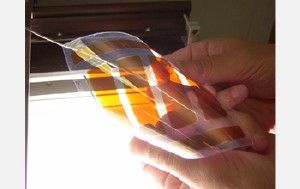Oct 1 2008
The National Science Foundation (NSF) announces 14 Materials Research Science and Engineering Centers (MRSECs) awarded as a result of the 2008 MRSEC competition (solicitation NSF 07-563).
 The National Science Foundation (NSF) recently awarded grants to 14 Materials Research Science and Engineering Centers (MRSECs) that address materials research issues that are important to society. This is a flexible amorphous silicon solar cell made for the Renewable Energy MRSEC at the Colorado School of Mines by an industrial partner of the center, MVSystems, Inc. Credit: Photo courtesy of MVSystems, Golden Colorado.
The National Science Foundation (NSF) recently awarded grants to 14 Materials Research Science and Engineering Centers (MRSECs) that address materials research issues that are important to society. This is a flexible amorphous silicon solar cell made for the Renewable Energy MRSEC at the Colorado School of Mines by an industrial partner of the center, MVSystems, Inc. Credit: Photo courtesy of MVSystems, Golden Colorado.
MRSECs support outstanding multi- and inter-disciplinary materials research and education addressing fundamental problems in science and engineering. These centers investigate complex problems that benefit from the scope and level of interactions provided by a center. They foster active collaboration among universities, other MRSECs, industry, and National Laboratories.
"We are delighted to fund 14 MRSECs including five new centers," said Zakya H. Kafafi, director for NSF's Division of Materials Research (DMR). "These centers will promote the progress of materials science and education in important and timely areas such as sustainable energy, bio- and soft-materials and, next-generation electronics and photonics. In this regard, MRSECs will help further our economic competitiveness and our ability to live sustainably on earth, and will contribute to DMR's efforts of broadening participation, and bridging the gaps in materials education between different institutions at all levels."
The MRSECs are committed to broadening participation of underrepresented groups in materials research and education at all academic levels, and actively seek partnerships with schools, universities and colleges serving these groups which include women, minorities and people with disabilities.
Five new MRSECs were created as a result of the competition:
- The Renewable Energy Materials Research Science and Engineering Center at the Colorado School of Mines will study the unique properties of nanostructured materials to significantly enhance the performance of semiconductor photovoltaic devices and ion conducting composite membrane materials for fuel cells.
- The Georgia Tech Laboratory for New Electronic Materials at the Georgia Institute of Technology will focus on fundamental materials properties and synthesis of graphene, a material that may revolutionize microelectronics.
- The Ohio State University Center for Emergent Materials will perform research on new materials and phenomena in magnetoelectronics, future oxide-based electronic materials for devices that can perform multiple functions and energy-efficient, fast computers that have integrated memory and logic.
- The Brandeis University MRSEC on Constraints and Frustration in Nano-Structures and Bio-Molecular Materials will focus on the fundamental understanding of emergent and complex properties in materials due to constraints similar to those occurring in biological systems. The goal is to develop novel structures for applications such as biosensors and solar cells, and developing self-powered "active" matter that can move on its own, like living matter.
- The New York University MRSEC on Semantophoretic Assemblies will focus on colloidal architectures to understand the fundamental principles that govern the arrangement of microscopic particles and how novel materials can be created by manipulating particle shape, size and their interactions.
In addition, nine awards will support established centers which have successfully recompeted, in most cases with a significantly different focus of materials research and education.